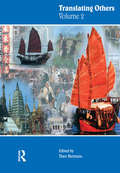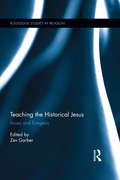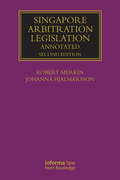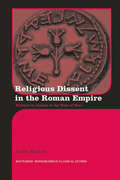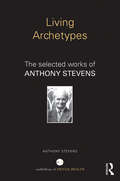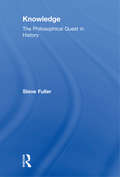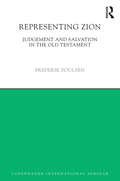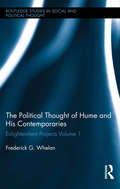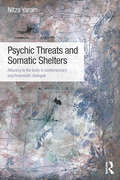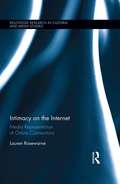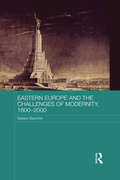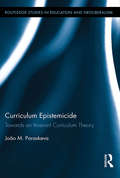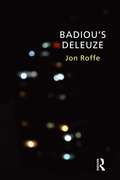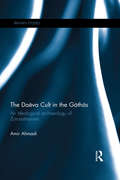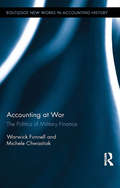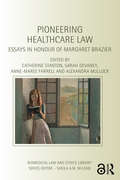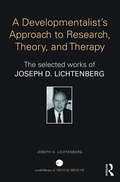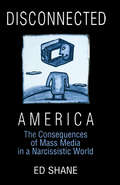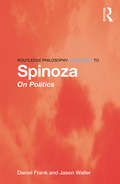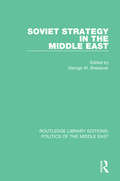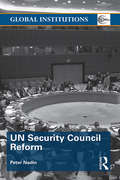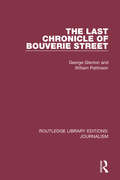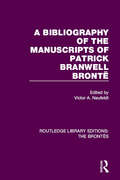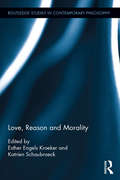Special Collections
Benetech’s Global Certified Accessible Titles
Description: Benetech’s GCA program is the first independent third-party EPUB certification to verify ebook accessibility. By creating content that is born accessible, publishers can meet the needs of all readers. Learn more: https://bornaccessible.benetech.org/
- Table View
- List View
Translating Others (Volume 2)
by Theo HermansBoth in the sheer breadth and in the detail of their coverage the essays in these two volumes challenge hegemonic thinking on the subject of translation. Engaging throughout with issues of representation in a postmodern and postcolonial world, Translating Others investigates the complex processes of projection, recognition, displacement and 'othering' effected not only by translation practices but also by translation studies as developed in the West. At the same time, the volumes document the increasing awareness the the world is peopled by others who also translate, often in ways radically different from and hitherto largely ignored by the modes of translating conceptualized in Western discourses. The languages covered in individual contributions include Arabic, Bengali, Chinese, Hindi, Irish, Italian, Japanese, Latin, Rajasthani, Somali, Swahili, Tamil, Tibetan and Turkish as well as the Europhone literatures of Africa, the tongues of medieval Europe, and some major languages of Egypt's five thousand year history. Neighbouring disciplines invoked include anthropology, semiotics, museum and folklore studies, librarianship and the history of writing systems. Contributors to Volume 2: Paul Bandia, Red Chan, Sukanta Chaudhuri, Annmarie Drury, Ruth Evans, Fabrizio Ferrari, Daniel Gallimore, Hephzibah Israel, John Tszpang Lai, Kenneth Liu-Szu-han, Ibrahim Muhawi, Martin Orwin, Carol O'Sullivan, Saliha Parker, Stephen Quirke and Kate Sturge.
Teaching the Historical Jesus
by Zev GarberTeaching the Historical Jesus in his Jewish context to students of varied religious backgrounds presents instructors with not only challenges, but also opportunities to sustain interfaith dialogue and foster mutual understanding and respect. This new collection explores these challenges and opportunities, gathering together experiential lessons drawn from teaching Jesus in a wide variety of settings—from the public, secular two- or four-year college, to the Jesuit university, to the Rabbinic school or seminary, to the orthodox, religious Israeli university. A diverse group of Jewish and Christian scholars reflect on their own classroom experiences and explicates crucial issues for teaching Jesus in a way that encourages students at every level to enter into an encounter with the Hebrew Scriptures and the New Testament without paternalism, parochialism, or prejudice. This volume is a valuable resource for instructors and graduate students interested in an interfaith approach in the classroom, and provides practical case studies for scholars working on Jewish-Christian relations.
Singapore Arbitration Legislation
by Robert Merkin and Johanna HjalmarssonThe book provides a comprehensive and in depth guide to the regulatory framework in Singapore, the first of its kind for the foremost jurisdiction for international arbitration in the Asia-Pacific geographic zone. It is designed with practitioners in mind and provides terse and specific but detailed and well-informed commentary to each of the sections in the applicable arbitration acts. The book sets out and annotates the two legislative acts applicable to arbitration in Singapore, as well as the Singapore International Arbitration Centre Rules. It also contains a few international documents including the Uncitral Model Law and the New York Convention.
Religious Dissent in the Roman Empire
by Vasily RudichReligious Dissent in the Roman Empire is the third installment in Vasily Rudich’s trilogy on the psychology of discontent in the Roman Empire at the time of Nero. Unlike his earlier books, it deals not with political dissidence, but with religious dissent, especially in its violent form. Against the broad background of Second Temple Judaism and Judaea’s history under Rome’s rule, Rudich discusses various manifestations of religious dissent as distinct from the mainstream beliefs and directed against both the foreign occupier and the priestly establishment. This book offers the methodological framework for the analysis of the religious dissent mindset, which it considers a recurrent historical phenomenon that may play a major role in different periods and cultures. In this respect, its findings are also relevant to the rise of religious violence in the world today and provide further insights into its persistent motives and paradigms. Religious Dissent in the Roman Empire is an important study for people interested in Roman and Jewish history, religious psychology and religious extremism, cultural interaction and the roots of violence.
Living Archetypes
by Anthony StevensAnthony Stevens has devoted a lifetime to modernizing our understanding of the archetypes within us, relating them to conceptual developments in a variety of scientific disciplines, such as the patterns of behaviour of behavioural ecology, the species-specific behavioural systems of Bowlby’s attachment theory, the deep structures of Chomskian linguistics, and the modules of evolutionary psychology, to name but a few. This selection of papers and chapters from the course of Stevens’ career, all lucidly written and argued, highlight episodes in the progress of his quest to place archetypal theory on a sound scientific foundation. As a whole, Living Archetypes examines how archetypes are activated in the life history of all of us, how archetypal imperatives may be fulfilled or thwarted by our living circumstances, how they manifest in our dreams, symbols, fantasies and symptoms, and how appreciating their dynamics can generate insights of enormous therapeutic power. Living Archetypes: The Selected Works of Anthony Stevens provides an invaluable resource for Jungian psychotherapists, psychologists, academics and students committed to extending the evolutionary approach to psychology and psychiatry and understanding the dynamic significance of archetypes.
Knowledge
by Steve FullerThe theory of knowledge, or epistemology, is often regarded as a dry topic that bears little relation to actual knowledge practices. Knowledge: The Philosophical Quest in History addresses this perception by showing the roots, developments and prospects of modern epistemology from its beginnings in the nineteenth century to the present day. Beginning with an introduction to the central questions and problems in theory of knowledge, Steve Fuller goes on to demonstrate that contemporary epistemology is enriched by its interdisciplinarity, analysing keys areas including: Epistemology as Cognitive Economics Epistemology as Divine Psychology Epistemology as Philosophy of Science Epistemology as Sociology of Science Epistemology and Postmodernism. A wide-ranging and historically-informed assessment of the ways in which man has - and continues to - pursue, question, contest, expand and shape knowledge, this book is essential reading anyone in the Humanities and Social Sciences interested in the history and practical application of epistemology.
Representing Zion
by Frederik PoulsenThe prophetic books of the Old Testament offer a fascinating collection of oracles, poetic images, and theological ideas. Among the most prominent themes are those of judgment and salvation, especially concerning the fate of Zion. This place, where the people of God dwell, is alternately presented as either the object of divine wrath or the image of a salvific ideal.Representing Zion provides a thorough and critical study of the images of Zion in the entire prophetic literature of the Old Testament. The book challenges traditional interpretations of Zion and offers a fresh exploration of the literary and theological nature of the biblical writings. Zion has largely been treated by scholars as an image of the inviolable city consistently and unambiguously used by Old Testament authors. Representing Zion reveals the Zion motif to be contested, complex and profoundly theological—a reflection of the ambiguous role of YHWH as judge and saviour.
Political Thought of Hume and his Contemporaries
by Frederick G. WhelanIntended for scholars in the fields of political theory, and the history of political thought, this two-volume examines David Hume's Political Thought (1711-1776) and that of his contemporaries, including Smith, Blackstone, Burke and Robertson. This book is unified by its temporal focus on the middle and later decades of the eighteenth century and hence on what is usually taken to be the core period of the Enlightenment, a somewhat problematic term. Covering topics such as property, contract and resistance theory, religious establishments, the law of nations, the balance of power, demography, and the role of unintended consequences in social life, Frederick G. Whelan convincingly conveys the diversity--and creativity--of the intellectual engagements of even a limited set of Enlightenment thinkers in contrast to dismissive attitudes, in some quarters, toward the Enlightenment and its supposed unitary project. Political Thought of Hume and his Contemporaries: Enlightenment Projects Vol. 1 contains six in-depth studies of issues in eighteenth-century political thought, with an emphasis on topics in normative theory such as property rights, the social contract, resistance to oppressive government, and religious liberty. The central figure is David Hume, with substantial attention to Edmund Burke, Adam Smith, and others in the period. The introduction situates the studies in the Enlightenment and considers interpretations of that movement.
Psychic Threats and Somatic Shelters
by Nitza YaromThere is increasing recognition within psychoanalysis and related therapies that awareness of the body is important in understanding and treating patients. Psychic Threats and Somatic Shelters explores the ways in which adults and children become acquainted with the range of physical issues that arise within their psychoanalytic or psychological treatments. Nitza Yarom discusses in a practical and clinically focused way the large variety of physical outlets which today’s person uses to shelter from the many troubles and restrictions that are placed on everyday life. Her book is divided into two main sections: Somatic shelters, which explores the variety of physical symptoms encountered by patients, including problems with weight and eating; with sensation through sight, sound, smell and taste; in movement through hyper activity or rigidity and through the communication of physical pain. Embodied dialogue, in which the author updates the use of the basic technical principles of psychoanalysis to involve the body in the treatment including transference and counter-transference between analyst and patient. In Psychic Threats and Somatic Shelters the emotional communication of these body narratives are vividly demonstrated in the treatments presented, here the interaction in the consulting room is revealed in bodily resonance and its therapeutic effects. This book is written for psychoanalysts and psychotherapists, psychologists, body therapists, family therapists, social workers and art/movement therapists.
Intimacy on the Internet
by Lauren RosewarneThe focus of this book is on the media representations of the use of the Internet in seeking intimate connections—be it a committed relationship, a hook-up, or a community in which to dabble in fringe sexual practices. Popular culture (film, narrative television, the news media, and advertising) present two very distinct pictures of the use of the Internet as related to intimacy. From news reports about victims of online dating, to the presentation of the desperate and dateless, the perverts and the deviants, a distinct frame for the intimacy/Internet connection is negativity. In some examples however, a changing picture is emerging. The ubiquitousness of Internet use today has meant a slow increase in comparatively more positive representations of successful online romances in the news, resulting in more positive-spin advertising and a more even-handed presence of such liaisons in narrative television and film. Both the positive and the negative media representations are categorised and analysed in this book to explore what they reveal about the intersection of gender, sexuality, technology and the changing mores regarding intimacy.
The Responsibility to Protect in International Law
by Susan BreauThis book will consider a rapidly emerging guiding general principle in international relations and, arguably, in international law: the Responsibility to Protect. This principle is a solution proposed to a key preoccupation in both international relations and international law scholarship: how the international community is to respond to mass atrocities within sovereign States. There are three facets to this responsibility; the responsibility to prevent; the responsibility to react, and the responsibility to rebuild. This doctrine will be analysed in light of the parallel development of customary and treaty international legal obligations imposing responsibilities on sovereign states to the international community in key international law fields such as international human rights law, international criminal law and international environmental law. These new developments demand academic study and this book fills this lacuna by rigorously considering all of these developments as part of a trend towards assumption of international responsibility. This must include the responsibility on the part of all states to respond to threats of genocide, crimes against humanity, ethnic cleansings and large-scale war crimes. The discussion surrounding aggravated state responsibility is also explored, with the author concluding that this emerging norm within international law is closely related to the responsibility to protect in its imposition of an international responsibility to act in response to an international wrong. This book will be of great interest to scholars on international law, the law of armed conflict, security studies and IR in general.
Eastern Europe and the Challenges of Modernity, 1800-2000
by Stefano BianchiniThis book presents a concise and comprehensive overview of the mainstream flows of ideas, politics and itineraries towards modernity in Central and Eastern Europe and the Balkans over two centuries from the beginning of the nineteenth century to the end of the Gorbachev administration. Unlike other books on the subject which view modernity based on the idea of Western European supremacy, this book outlines the various different pathways of development, and of growing industrialisation, urbanisation and secularisation which took place across the region. It provides rich insights on the complex networks whereby very varied ideas, aspirations and policies interacted to bring about a varied pattern of progress, and of integration and isolation, with different areas moving in different ways and at different paces. Overall the book presents something very different from the traditional picture of the" two Europes". Particular examples covered include agrarian reform movements, in various phases, different models of socialism, and different models of socialist reform.
Curriculum Epistemicide
by João M. ParaskevaAround the world, curriculum – hard sciences, social sciences and the humanities – has been dominated and legitimated by prevailing Western Eurocentric Anglophone discourses and practices. Drawing from and within a complex range of epistemological perspectives from the Middle East, Africa, Southern Europe, and Latin America, this volume presents a critical analysis of what the author, influenced by the work of Sousa Santos, coins curriculum epistemicides, a form of Western imperialism used to suppress and eliminate the creation of rival, alternative knowledges in developing countries. This exertion of power denies an education that allows for diverse epistemologies, disciplines, theories, concepts, and experiences. The author outlines the struggle for social justice within the field of curriculum, as well as a basis for introducing an Itinerant Curriculum Theory, highlighting the potential of this new approach for future pedagogical and political praxis.
Badiou's Deleuze
by Jon RoffeBadiou's Deleuze presents the first thorough analysis of one of the most significant encounters in contemporary thought: Alain Badiou's summary interpretation and rejection of the philosophy of Gilles Deleuze. Badiou's reading of Deleuze is largely laid out in his provocative book, Deleuze: The Clamor of Being, a highly influential work of considerable power. Badiou's Deleuze presents a detailed examination of Badiou's reading and argues that, whilst it fails to do justice to the Deleuzean project, it invites us to reconsider what Deleuze's philosophy amounts to, to reassess Deleuze's power to address the ultimate concerns of philosophy. Badiou's Deleuze analyses the differing metaphysics of two of the most influential of recent continental philosophers, whose divergent views have helped to shape much contemporary thought.
The Daēva Cult in the Gāthās
by Amir AhmadiAddressing the question of the origins of the Zoroastrian religion, this book argues that the intransigent opposition to the cult of the daēvas, the ancient Indo-Iranian gods, is the root of the development of the two central doctrines of Zoroastrianism: cosmic dualism and eschatology (fate of the soul after death and its passage to the other world). The daēva cult as it appears in the Gāthās, the oldest part of the Zoroastrian sacred text, the Avesta, had eschatological pretentions. The poet of the Gāthās condemns these as deception. The book critically examines various theories put forward since the 19th century to account for the condemnation of the daēvas. It then turns to the relevant Gāthic passages and analyzes them in detail in order to give a picture of the cult and the reasons for its repudiation. Finally, it examines materials from other sources, especially the Greek accounts of Iranian ritual lore (mainly) in the context of the mystery cults. Classical Greek writers consistently associate the nocturnal ceremony of the magi with the mysteries as belonging to the same religious-cultural category. This shows that Iranian religious lore included a nocturnal rite that aimed at ensuring the soul’s journey to the beyond and a desirable afterlife. Challenging the prevalent scholarship of the Greek interpretation of Iranian religious lore and proposing a new analysis of the formation of the Hellenistic concept of ‘magic,’ this book is an important resource for students and scholars of History, Religion and Iranian Studies.
Accounting at War
by Warwick Funnell and Michele ChwastiakAccounting is frequently portrayed as a value free mechanism for allocating resources and ensuring they are employed in the most efficient manner. Contrary to this popular opinion, the research presented in Accounting at War demonstrates that accounting for military forces is primarily a political practice. Throughout history, military force has been so pervasive that no community of any degree of complexity has succeeded in. Through to the present day, for all nation states, accounting for the military and its operations has primarily served broader political purposes. From the Crimean War to the War on Terror, accounting has been used to assert civilian control over the military, instill rational business practices on war, and create the visibilities and invisibilities necessary to legitimize the use of force. Accounting at War emphasizes the significant power that financial and accounting controls gave to political elites and the impact of these controls on military performance. Accounting at War examines the effects of these controls in wars such as the Crimean, South African and Vietnam wars. Accounting at War also emphasizes how accounting has provided the means to rationalize and normalize violence, which has often contributed to the acceleration and expansion of war. Aimed at researchers and academics in the fields of accounting, accounting history, political management and sociology, Accounting at War represents a unique and critical perspective to this cutting-edge research field.
Pioneering Healthcare Law
by Anne-Maree Farrell and Alexandra Mullock and Catherine Stanton and Sarah DevaneyThis book celebrates Professor Margaret Brazier’s outstanding contribution to the field of healthcare law and bioethics. It examines key aspects developed in Professor Brazier’s agenda-setting body of work, with contributions being provided by leading experts in the field from the UK, Australia, the US and continental Europe. They examine a range of current and future challenges for healthcare law and bioethics, representing state-of-the-art scholarship in the field. The book is organised into five parts. Part I discusses key principles and themes in healthcare law and bioethics. Part II examines the dynamics of the patient–doctor relationship, in particular the role of patients. Part III explores legal and ethical issues relating to the human body. Part IV discusses the regulation of reproduction, and Part V examines the relationship between the criminal law and the healthcare process. Offering a collaborative review of key and innovative themes in the field, the book will be of great interest and use to academics and students working in healthcare law and bioethics, and those working in health policy, law and regulation at both national and international levels. Chapter 10 of this book is freely available as a downloadable Open Access PDF at www.tandfebooks.com/openaccess. It has been made available under a Creative Commons Attribution-Non Commercial-No Derivatives 3.0 license.
Selected Papers of Joseph Lichtenberg
by Joseph LichtenbergThe World Library of Mental Health celebrates the important contributions to mental health made by leading experts in their individual fields. Each author has compiled a career-long collection of what they consider to be their finest pieces: extracts from books, journals, articles, major theoretical and practical contributions, and salient research findings. Leading psychoanalyst Joseph D. Lichtenberg is one of the most experienced and best respected psychoanalysts working in the US at present. In A Developmentalist's Approach to Research, Theory, and Therapy, he provides the reader with an opportunity to track the development of his conceptions in three realms of psychoanalysis: Infant studies and developmentalist perspectives on the life cycleTheoretical contributions to self-psychology Motivational clinical contributionsJoseph Lichtenberg is a hugely influential name within US Psychoanalysis circles; this is the first collection of the seminal papers from his very long and distinguished career.
Disconnected America
by Michael C. Keith and Ed ShaneEd Shane here traces a change in the American pervasive mass media that once disseminated information quickly and stimulated mass cultural response, to a de-massified individual media that incubate a new electronic narcissicism, producing an inwardly-focused society.
Routledge Philosophy GuideBook to Spinoza on Politics
by Daniel Frank and Jason WallerBaruch Spinoza is one of the most influential and controversial political philosophers of the early modern period. Though best-known for his contributions to metaphysics, Spinoza’s Theological-Political Treatise (1670) and his unfinished Political Treatise (1677) were widely debated and helped to shape the political writings of philosophers as diverse as Rousseau, Kant, Marx, Nietzsche, and (although he publicly denied it) even Locke. In addition to its enormous historical importance, Spinoza’s political philosophy is also strikingly contemporary in its advocacy of toleration of unpopular religious and political views and his concern with stabilizing religiously diverse democratic societies. The first Guidebook to Spinoza’s political writings, The Routledge Philosophy Guidebook to Spinoza on Politics covers the following key points: Spinoza’s life and the background to his philosophy the key themes and arguments of the Theological-Political-Treatise and Political Treatise the continuing importance of Spinoza’s work to philosophy. This book is an ideal starting point for anyone new to Spinoza and essential reading for students of political philosophy and seventeenth-century philosophy.
Soviet Strategy in the Middle East
by James Clay Moltz and Galia Golan and Benjamin Miller and George W. Breslauer and Yaacov Ro’i and Dennis B. RossFew regions of the world are as politically turbulent as the Middle East, and nowhere is the potential for superpower conflict greater. How does the Soviet Union view the Middle east conflict? Can the USSR play a constructive role in the peace process? In this volume, first published in 1990, these questions and others central to an understanding of Soviet strategy in the region are addressed. Previous analysts of Soviet-Middle Eastern relations have tended to emphasize either the cooperative or the competitive aspects of Soviet behaviour. Breslauer instead offers the multidimensional concept of ‘collaborative competition’ to describe the mixed motives, ambivalence, and sometimes conflicting perspectives that have informed Soviet strategy in the region. In such an unstable environment. this strategy of collaborative competition has in turn encouraged ‘approach-avoidance’ behaviour; for example, while the Soviets may seek to moderate their radical allies, they remain fearful that these allies, once moderated, might defect to US patronage. Under Gorbachev, the Kremlin continues to pursue this same strategy but with increased attention to improving collaboration, redefining the nature of the competition, and easing the approach-avoidance dilemma. Breslauer argues that these changes could lead to more flexible Soviet behaviour in the region. This volume combines new, in-depth research on Soviet policy with new interpretations, including insights drawn from relevant theories of international relations.
UN Security Council Reform
by Peter NadinThis volume comprehensively evaluates the current state and future reform prospects of the UN Security Council, providing the most accessible and rigorous treatment of the subject of reform to date. Apart from a couple of critical eyes in the academic community, few have asked the pertinent questions that this volume seeks to address: Will the enlargement of the Council constitute a reform? Could the inclusion of countries such as India, Germany, Japan, and Brazil markedly improve the Council’s agency? In response, this book focuses on: The Role and Agency of the UN Security Council The History of the Reform Debate An Expanded Council Working Method Reforms Enhancing Agency As the future of the UN Security Council continues to be the focus of fierce debate, this book will be essential reading for students of international relations, international organizations and international security studies alike.
The Last Chronicle of Bouverie Street
by George Glenton and William PattinsonOriginally published in 1963. This book tells the story of the closure of the News Chronicle and its London evening companion The Star as seen by two journalists on the News Chronicle. They describe the Daily News tradition, record some of its finest hours and write about some of the greatest journalists who served their employers loyally. They endeavour to unravel what went on in Bouverie Street immediately before, at the moment of the crash and afterwards. The merger of these two prominent organs of public opinion with the Daily Mail and Evening News made splash headlines and was widely discussed in the press, on television and radio. Faithful readers were dismayed, politicians were alarmed, and the staff of the newspapers were indignant. For 114 years the Daily News and its modern successor the News Chronicle had weathered financial storms and overcome gales of prejudice and political opinion to become one of the most respected morning papers. The Star had, since 1888, fought the cause of the underdog and earned the affection and gratitude of many Londoners. This book highlights the feelings of men and women who were proud to work for their paper but did not know till almost the very last that they were fighting a losing battle, and how and why some of them kept the secret.
A Bibliography of the Manuscripts of Patrick Branwell Brontë
by Victor A. NeufeldtThis bibliography, first published in 1993, attempts to provide a complete and accurate description of the manuscripts of Patrick Branwell Brontë, excluding his letters. Its aim is not only to correct previous errors and update and extend earlier lists, but also to reconstruct as far as possible dismembered and scattered manuscripts. This book will be of interest to students of English Literature.
Love, Reason and Morality
by Katrien Schaubroeck and Esther KroekerThis book brings together new essays that explore the connection between love and reasons. The observation that considerations of love carry significant weight in the deliberative process opens up new perspectives in the classic discussion about practical reasons, and gives rise to many interesting questions about the nature of love’s reasons, about their source and legitimacy, about their relation to moral and epistemic reasons, and about the extent to which love is sensitive to reasons. The contributors to this volume orient questions related to love within the broader context of the contemporary discussion on practical reasons, and move forward the conversation about the normative dimensions of love. Love, Reason and Morality will be of interest to philosophers working on issues of normativity, meta-ethics and moral psychology, and especially those interested in the source of practical reasons and the role of attachments in practical deliberation.
